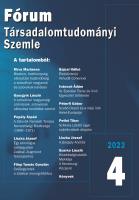Az intézményekbe vetett bizalom, a politikai hatékonyság és a választási hajlandóság összefüggései a szlovákiai magyarok és szlovákok körében
The Correlation Between Trust in Institutions, Political Efficacy and Voting Propensity Among Hungarians and Slovaks in Slovakia
Author(s): Marianna MrvaSubject(s): Crowd Psychology: Mass phenomena and political interactions, Sociology of Politics
Published by: Fórum Kisebbségkutató Intézet
Keywords: participation in elections; propensity to vote; trust; institutional trust; political efficacy; external political efficacy; internal political efficacy; Hungarians in Slovakia
Summary/Abstract: In many cases, the level of participation in elections can be decisive: it can determine who gets into the parliament, who forms the government, and what topics are emphasised. Beyond being a political issue, it interests social scientists as well. They follow the issue outside the election period too. They investigate the electoral propensity to vote, the composition of the group of those who would vote and those who would not, the factors that most influence the propensity to vote, etc. This paper builds on the tradition of previous research and examines two possible factors in more detail. These are institutional trust and political efficacy, which many sources have found to be related to electoral propensity. It also pays particular attention to the comparison between Slovaks and Hungarians in Slovakia, concluding that a sense of internal and external political efficacy is related to electoral propensity, but that institutional trust and ethnicity are not determinants of this.
Journal: Fórum Társadalomtudományi Szemle
- Issue Year: XXV/2023
- Issue No: 4
- Page Range: 3-18
- Page Count: 16
- Language: Hungarian

